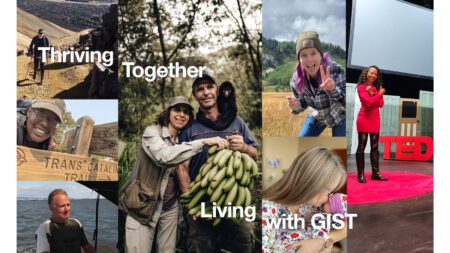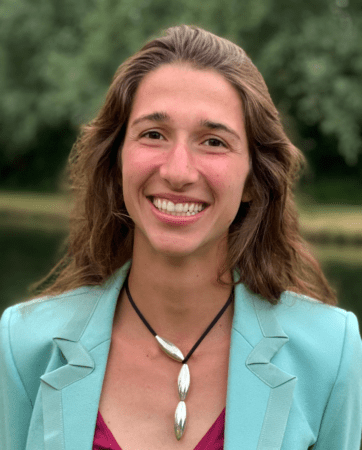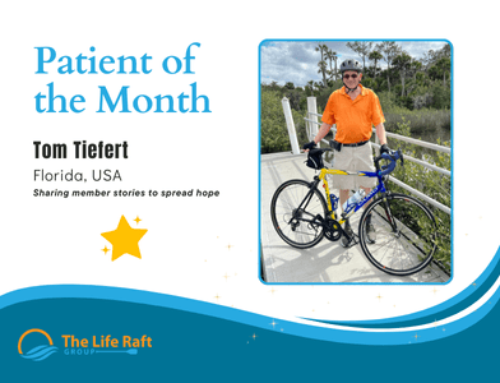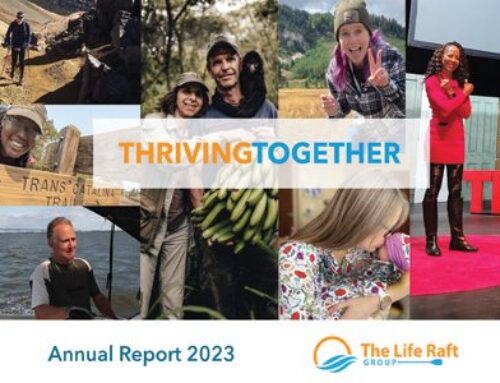 Our theme for 2023 is Thriving Together and we are going to illustrate that concept throughout the year by sharing the celebrations, triumphs, and milestones that our community is experiencing while living with GIST. See more exciting highlights from #thrivingtogether.
Our theme for 2023 is Thriving Together and we are going to illustrate that concept throughout the year by sharing the celebrations, triumphs, and milestones that our community is experiencing while living with GIST. See more exciting highlights from #thrivingtogether.
Our Patient of the Month for April is Adriana Perez Rotondo. Here is her story:
GISTory

Adriana Perez Rotondo, Madrid, Spain
I became a member of The Life Raft Group in October 2022, but my GISTory goes way back.
The 1st of September of 2014, hours before I was supposed to fly from Madrid, Spain to New York to start my sophomore year of college, my OB-GYN found a 12cm mass in my abdomen during a routine appointment. I was certainly worried; my doctor had just told me my hemoglobin was extremely low and that the mass could be a serious thing. However, I didn’t have any symptoms and was more excited to be going back to college than anything else. My doctor made me promise that I would have the mass followed up immediately in NY and off I went. In NY, I immediately went to see my doctor to explain the situation to get the required tests and follow up, but it took almost a week to schedule an appointment with an OBGYN. My mother convinced me to come back to Madrid to get it checked out, promising me that if it was nothing, I could go back to college. She scheduled all my appointments impeccably.
In four days, I had a blood transfusion, a CT, MRI, PET scan and then surgery. It all went so fast that I had no time to process anything, I just knew it had to be done. The surgery was a success, they resected the mass with good margins and found it was only attached to the ilium. There were no other tumors. The surgeons were still not certain of what the tumor was. I was convinced I would be able to go back to college in a couple of weeks to resume my semester so I kept up with my homework in the hospital.
The hard news came a week later when the pathology results confirmed it was GIST. Luckily, I was referred to a specialist who ordered a mutational study immediately. He explained that although the mitotic rate was quite low due to the size and location that, I was a high-risk patient and he put me on adjuvant imatinib immediately. The diagnosis was really daunting. I was not expecting it would be anything serious, let alone cancer. Who would? I was 18 years old, healthy and had had no symptoms. My doctor, Dr. Cubedo, was very calming and reassuring. He insisted that with adjuvant imatinib, the prognosis was really good especially having the mutation in KIT exon 11. If I am honest, I am not sure how I felt at the time, I just remember it being a weird, foggy time. I recovered very well from the surgery, took a medical leave from college, went back to NY to see my friends and to empty my college dorm room, and then found some fun internships in Madrid for the rest of the semester.
Luckily, I had almost no side effects with imatinib and could resume with my normal life while keeping up with my regular CT scans and blood tests. I graduated college on time and moved to Cambridge, UK, to pursue a master’s degree. In October 2017, after three years of adjuvant imatinib, we discontinued treatment, as specified by the treatment guidelines in Spain. All my follow up CTs were NED, and I was glad to be leaving that scary time behind. I started a PhD program and began rowing at an elite level. I felt I had left cancer in the past. I was training 17 hours a week, alongside Olympians, and felt my body was strong and healthy (apart from some annoying occasional pseudo-obstructive episodes that resolved themselves).
In July 2022, as I was starting to write up my PhD and about to join the Spanish rowing team for the summer season, an MRI found a small 3cm mass attached to the abdominal wall. This took me by complete surprise, I felt fine, I felt great, how could my body be letting me down like this?
We scheduled a surgery for September to take the mass out. I made the most out of the summer rowed alongside Olympians and was offered a spot to train with the Spanish team for the 2024 Paris Olympics. This was very exciting; part of me knew that it probably wouldn’t be possible, but the other part hoped the mass wouldn’t be GIST, and that I would be able to resume with my life.
The surgery was successful. They took out the 3cm mass they had seen and another small mass (less than 1cm). The pathology results showed that both tumors were GIST with the same mutation as the one in 2014. Although I had known that this was the most likely scenario, it still hit me very hard. I had been NED for eight years, and it had been five years since I had stopped imatinib. I felt so healthy, and cancer was a very distant thought. And now everything was back, all the doctors’ appointments, the questions, the uncertainty…
I tried to adapt and keep on going with my life. I recovered well from the surgery, I moved to Switzerland with my partner, finished writing a paper, started writing my PhD thesis, and had a great fall hiking and skiing all around Switzerland.
In December 2022, two new small masses were found behind the abdominal wall. I am now on imatinib for the foreseeable future and waiting to evaluate progression from my next scans. However, I have just submitted my PhD thesis, and found a job starting in June.
Coping With a GIST Diagnosis
Throughout the last eight years, my way of coping with GIST has evolved a lot, but the most important factor hasn’t changed: being surrounded by the most supportive people.
After my first diagnosis in 2014, my approach was to avoid thinking as much as possible about the whole situation and try to get on with my life. I am now aware that this approach is definitely not ideal, but it is what worked for me at the time. The moment I was out of surgery I was back to doing homework, I kept busy, and tried to only think about my disease when I was at doctors’ appointments. I could only do that because I was lucky enough to have the best advocates around me making sure I got the best care. My parents organized all my doctors’ appointments and made sure I could get to them even when living abroad. I only had to attend, trust my doctors and follow their instructions.
Last September, I was diagnosed with metastatic GIST. This time around the diagnosis struck me a lot harder. I realized that GIST was going to be part of my life forever and I couldn’t ignore it. This time, I went the complete opposite direction. I researched all the treatments, read all the statistics and tried to get as much information as possible. It is during this research that I found The Life Raft Group (LRG) who gave me invaluable advice and put me in contact with a specialist. I joined Facebook support groups and found a community of people going through similar situations. Learning more about the disease and hearing other people’s stories made me feel a bit more in control of the situation.
I don’t think there is one right way of coping with GIST but it is useful to have tools and strategies to deal with the more difficult times. These are a couple of approaches that work for me:
- When thoughts about the disease, the uncertainties, and the future start to spin out of control, I try to ground myself concentrating on how I feel, how my body feels and what I can do in the present. I remind myself that I am doing alright now, that I am lucky to lead a relative normal life, and that I am following the best treatment I can.
- Throughout the diagnosis I have tried to set myself some goals for my recovery and for going back to life beyond my diagnosis. I started with small ones, walking five minutes a couple of days after my surgery, then went to bigger ones like running a half marathon months after or going back to work. However, I have found it essential to be adaptable. There are so many things we can’t control with GIST – the results of tests, the effect of medication, etc. I still get frustrated but try to adapt when I have tougher days and to tune my goals and expectations accordingly. I know that whatever lies ahead, I will learn to cope with it.
Advice for Fellow GISTers
– Find a GIST specialist to treat you. I am so grateful I was referred to one the moment I was diagnosed; he asked for mutational testing immediately and put me on the right medication afterwards. These last six months, being in contact with the LRG, I have learned how big of a difference a specialist can make with the prognosis of a rare cancer like GIST.
– Try to inform yourself on the specifics of your GIST, what mutation(s) you have, what are the implications on the treatments, what clinical studies are out there? I found the YouTube videos in The Life Raft Group channel very useful.
– Each case is unique, and the statistics don’t determine your story. Looking at prognosis and statistics of overall survival rates can be quite scary. Studies don’t tend to look at prognosis beyond 20 years after diagnosis. As I am relatively young (27 now, and 18 at the time of diagnosis), I have found looking at statistics can be discouraging. I have to remind myself that statistics reflect that the median age of GIST patients is above 50 years, and that in general these numbers are useful to compare treatments but they don’t dictate my future.
– Ask your doctor all the questions you have and don’t be afraid to ask for a second opinion. It seems that especially with rare cancers there are a lot of unknowns, and the treatment is changing all the time. It is important to ask your doctors, but also to do your own research. For example, I am Spanish and I have always been treated here (in Spain), according to the National and European treatment guidelines. These guidelines can differ across countries. For instance, it seems that now in the US it is very common to keep high risk GIST patients for longer than three years on imatinib. Although it might not have changed anything, I think I would have liked to known that before stopping adjuvant treatment three years after my first tumor.
– It is okay to want more, we all deserve the best possible treatment. I feel I have been extremely lucky considering the situation. Even though I had a large tumor, it was found before it ruptured and removed with good margins. Even though, I was very young, I had the KIT exon 11 mutation which responds very well to imatinib. I had access to a great and fully free healthcare system. I have almost no side effects to imatinib. I was recurrence free for seven years which I was able to enjoy almost worry-free. I feel so lucky just be alive and be able to lead a relatively normal life. That is why sometimes I feel guilty asking doctors to help me with seemingly selfish things such as organizing tests around my academic and athletic goals, or asking about the effects of treatment on my fertility. However, I would like to think that it is okay to ask for more and aspire for a best possible quality of life around a disease that will probably be with me for the rest of my life.
Hobbies I Enjoy
I enjoy almost all sports but especially: rowing, running, cycling, swimming, skiing, climbing and hiking. When I am not exercising, I love cooking and baking bread (I started my sourdough right after my GIST diagnosis and it has come with me ever since).
Motto
This motto comes from my time rowing. When things got really tough and everything would start to spin out of control, we would remind each other to: Control the ‘controllables’. I have found that it applies to many aspects of life.
Each member story reflects the individual patient’s experience. GIST is not one disease, but a family of diseases and each patient has a unique set of symptoms and manifestation of the disease.
If you want to be our LRG Patient of the Month or Caregiver of the Month, please see the criteria below.
Criteria for Patient of the Month
- Patient must be a member of the LRG GIST Patient Registry
- Patient is an active member of the Patient Registry, continually providing medical updates
- Patient’s record should be at least 80% up-to-date
- Patient has GIST Patient Registry Online
- Patient must agree to provide consent to share his/her story to our GIST community on our website and social media
Criteria for Caregiver of the Month
Caregivers are an important team of family and friends. They allow a patient to depend on them for support through their difficult journey as well as help with various tasks such as cooking, housekeeping, transportation and so much more. In conjunction with Life Raft Group’s Patient of the Month, we are showcasing Caregivers of the Month. We want to hear stories of the selfless supporters that stand beside our GIST warriors.
Interested? Contact Sahibjeet Parmar, Director of Data Mgmt. & Research, for more information: sparmar@liferaftgroup.org



